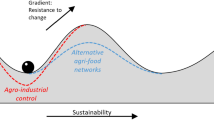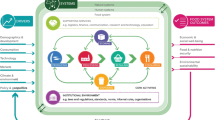Abstract
The Fair Trade movement seeks to alter conventional trade relations through a system of social and environmental standards, certification, and labels designed to help shorten the social distance between consumers in the North and producers in the South. The strategy is based on working both ‘in and against’ the same global capitalist market that it hopes to alter, raising questions about if and how Fair Trade initiatives exhibit counter-hegemonic potential to transform the conventional agro-food system. This paper considers the multiple levels at which Fair Trade alternatives operate to identify the different forms of social action that the movement engages with, and to clarify where the movement’s counter-hegemonic potentials are being realized. I suggest the Fair Trade movement is most successful in encouraging consumers and producers to commit acts of resistance and in supporting redistributive action that shifts resources from North to South. Up to now, however, Fair Trade alternatives appear to hold only a theoretical potential to provoke transformative change in the agro-food system. A reconceptualization of the Fair Trade model and how it is implemented could allow it to manifest more of its implicit, oppositional promise.
Similar content being viewed by others
References
P. Allen M. FitzSimmons M. Goodman K. Warner (2003) ArticleTitle“Shifting plates in the agrifood landscape: The tectonics of alternative agrifood initiatives in California” Journal of Rural Studies 19 61–75
M. Blowfield (1999) ArticleTitle“Ethical trade: A review of developments and issues” Third World Quarterly 20 IssueID4 753–770
M. B. Brown (1993) Fair Trade Zed Books London, UK
C. B. N. Chin J. H. Mittelman (2000) “Conceptualizing resistance to globalization” B. K. Gills (Eds) Globalization and the Politics of Resistance St. Martin’s Press New York 29–45
M. E. Conroy (2001) Can Advocacy-Led Certification Systems Transform Global Corporate Practices? Evidence and Some Theory Political Economy Research Institute Amherst, Massachusetts
InstitutionalAuthorNameEFTA (European Fair Trade Association) (2001a) Fair Trade in Europe 2001 EFTA Maastricht, The Netherlands
InstitutionalAuthorNameEFTA (2001b) Advocacy Newsletter 1 3–4
InstitutionalAuthorName EFTA (1998) Fair Trade Yearbook: towards 2000 Druk in de Weer Ghent, Belgium
A. Escobar (1995) Encountering Development: The Making and Unmaking of the Third World Princeton University Press Princeton, New Jersey
European Commission (1999). Communication from the Commission to the Council on Fair Trade. COM (1999) 619, November 29. Brussels, Belgium: European Commission (http://europa.eu. int/eur-lex/en/com/cnc/1999/com1999_0619en01.pdf.)
P. Evans (2000) ArticleTitle“Fighting marginalization with transnational networks: Counter-hegemonic globalization” Contemporary Sociology 29 230–41
FAO (Food and Agriculture Organization of the United Nations) (2000). “Banana experts hold landmark meeting at FAO”. FAO News & Highlights. Retrieved from www.fao.org on December 9, 2000.
FLO (Fairtrade Labelling Organizations International) (2003). “Impact: facts and figures”. Retrieved from www.fairtrade. net/sites/impact/facts.htm on July 24, 2003.
FLO (2001). “How does FLO work?” Retrieved from www. fairtrade.net/docs/how_does_flo_work.html on June 5, 2001.
FLO (2001). “How does FLO work?” Retrieved from www. fairtrade.net/docs/how_does_flo_work.html on June 5, 2001.
FLO (2000a). “News from the registers”. Information FLO, April.
FLO (2000b). “What about restructuring?” Information FLO, April.
FLO (n.d.). The Impact of Fairtrade Bananas. Internal Document.
P. Freire (2000) Pedagogy of the Oppressed Continuum New York
W. H. Friedland (1994) “The new globalization: The case of fresh produce” A. Bonanno L. Busch W. Friedland L. Gouveia E. Mingione (Eds) From Columbus to ConAgra: The Globalization of Agriculture and Food University of Kansas Press Lawrence, Kansas 210–231
Gereffi, G. (2000). “What is the long-term vision of a Fair Trade movement?” Report from Fair Trade Workshop, Keystone, Colorodo.
A. Gorz (1973) Socialism and Revolution Anchor Books New York
A. Gramsci (1971) Selections from the Prison Notebooks International Publishers New York
M. A. Grey (2000) ArticleTitle“The industrial food stream and its alternatives in the United States: An introduction” Human Organization 59 IssueID2 143–150
W. D. Heffernan (2000) “Concentration of ownership and control in agriculture” F. Magdoff J. B. Foster F. H. Buttel (Eds) Hungry for Profit: The Agribusiness Threat to Farmers, Food and the Environment Monthly Review Press New York 61–76
D. Held A. McGrew D. Goldblatt J. Perraton (1999) Global Transformations: Politics, Economics and Culture Stanford University Press Stanford, California
C. C. Hinrichs (2003) ArticleTitle“The practice and politics of food system localization” Journal of Rural Studies 19 33–45
D. James (2000) ArticleTitle“Justice and java: Coffee in a fair trade market” NACLA Report on the Americas 34 IssueID2 11–14
James, D. (2002). “Consumer activism and corporate accountability”. Journal of Research for Consumers 3 (http://jrc.bpm.ecu.edu.au/index.asp).
Johnston, J. (2003). “Counter-hegemony or bourgeois piggery? Food politics and the case of FoodShare.” Paper presented at the RC-40 Mini-Conference on Resistance and Agency in Contemporary Agriculture and Food: Empirical Cases and New Theories, Austin, Texas, June 13–14.
M. Kennedy C. Tilly (1990) “Transformative populism and the development of a community of color” J. M. Kling P. S. Posner (Eds) Dilemmas of Activism: Class, Community, and the Politics of Local Mobilization Temple University Press Philadelphia, Pennysylvania 302–324
H. Lamb R. Belling (2000) “Review of the implementation of the Fair Trade certification programme in banana production and trade” BibInstitutionalEditorNameFAO (Eds) Report: Ad-hoc Expert Meeting on Socially and Environmentally Responsible Banana Production and Trade FAO Rome, Italy 42–43
S. M. Lélé (1991) ArticleTitle“Sustainable development: A critical review” World Development 19 IssueID6 607–621
Lyon, S. (2003). “Fantasies of social justice and equality: Market relations and the future of Fair Trade”. Paper presented at the XXIV International Congress of the Latin American Studies Association, Dallas, Texas, March 28.
F. Magdoff J. B. Foster F. H. Buttel (Eds) (2000) Hungry for Profit: The Agribusiness Threat to Farmers, Food, and the Environment Monthly Review Press New York
Mao Tse-Tung (1967) “On contradiction”.Selected Works of Mao Tse-Tung, Vol. I Foreign Languages Press Peking, China 331–347
T. Marsden (2000) ArticleTitle“Food matters and the matter of food: Towards a new food governance?” Sociologia Ruralis 40 IssueID1 20–29
K. Marx F. Engels (1988) The Communist Manifesto Prometheus Books Buffalo, New York
P. McMichael (2000a) “Global food politics”The Agribusiness Threat to Farmers, Food, and the Environment F. Magdoff J. B. Foster F. H. Buttel (Eds) Hungry for Profit Monthly Review Press New York 125–143
P. McMichael (2000b) ArticleTitle“The power of food” Agriculture and Human Values 17 21–33
D. L. Murray L. T. Raynolds (2000) ArticleTitle“Alternative trade in bananas: Obstacles and opportunities for progressive social change in the global economy” Agriculture and Human Values 17 65–74
D. Murray L. T. Raynolds P. L. Taylor (2003) One Cup at a Time: Poverty Alleviation and Fair Trade Coffee in Latin America Fair Trade Research Group, Colorado State University Fort Collins, Colorado
L. T. Raynolds (2000) ArticleTitle“Re-embedding global agriculture: The international organic and Fair Trade movements” Agriculture and Human Values 17 297–309
L. T. Raynolds (2002) ArticleTitle“Consumer/producer links in Fair Trade coffee networks” Sociologia Ruralis 42 IssueID4 404–424
B. J. Reagon (1982) ArticleTitle“My black mothers and sisters or on beginning a cultural autobiography” Feminist Studies 8 IssueIDSpring 81–96
M. C. Renard (1999) ArticleTitle“The interstices of globalization: The example of fair coffee” Sociologia Ruralis 39 IssueID4 484–500
M. C. Renard (2003) ArticleTitle“Fair trade: Quality, market and conventions” Journal of Rural Studies 19 87–96
W. Sachs (1993) “Global ecology in the shadow of ‘development’” W. Sachs (Eds) Global Ecology: A New Arena of Political Conflict Zed Books London, UK 3–21
J. C. Scott (1990) Domination and the Arts of Resistance: Hidden Transcripts Yale University Press New Haven, Connecticut
Shreck, A. (2002a). Just Bananas? A Fair Trade Alternative for Small-Scale Producers in the Dominican Republic. PhD dissertation. Department of Sociology, Colorado State University, Ft. Collins, Colorado.
A. Shreck (2002b) ArticleTitle“Just bananas Fair trade banana production in the Dominican Republic” International Journal of Sociology of Agriculture and Food 10 IssueID2 11–21
A. Starr (2000) Naming the Enemy: Anti-Corporate Movements Confront Globalization Zed Books London, UK
A. Tallontire (2000) ArticleTitle“Partnerships in fair trade: Reflections from a case study of Cafédirect” Development in Practice 10 IssueID2 166–177
K. Tanaka L. Busch (2003) ArticleTitle“Standardization as a means for globalizing a commodity: The case of rapeseed” Rural Sociology 68 IssueID1 22–45
Tiffen, P. (1999). “The way forward: How and when the alternative traders can say that ‘the market is wrong’.” Paper Presented at IFAT Conference on The Business of Fair Trade: Livelihoods, Markets and Sustainability, Milan, Italy, May 9–14.
L. Waridel S. Teitelbaum (1999) Fair Trade: Contributing to Equitable Commerce ÉquiTerre. Quebec, Canada
Watkins, K. (1998). “Green dream turns turtle.” The Guardian, September 9, 1998: 4.
S. Whatmore L. Thorne (1997) “Nourishing networks: Alternative geographies of food” D. Goodman M. Watts (Eds) Globalising Food: Agrarian Questions and Global Restructuring Routledge London, UK 287–304
Zonneveld, L. (2003). “2001-2002: The year in review.” FLO News Bulletin January. Retrieved from www.fairtrade. net/sites/new/bulletin.htm on July 25, 2003.
Author information
Authors and Affiliations
Corresponding author
Additional information
Aimee Shreckis a sociologist and the Research Specialist for the California Faculty Association. Her previous work as a postdoctoral researcher with the University of California, Berkeley and the Sustainable Agriculture Research and Education Program focused on social justice, sustainable agriculture, and fair trade.
Rights and permissions
About this article
Cite this article
Shreck, A. Resistance, redistribution, and power in the Fair Trade banana initiative. Agric Hum Values 22, 17–29 (2005). https://doi.org/10.1007/s10460-004-7227-y
Accepted:
Issue Date:
DOI: https://doi.org/10.1007/s10460-004-7227-y




